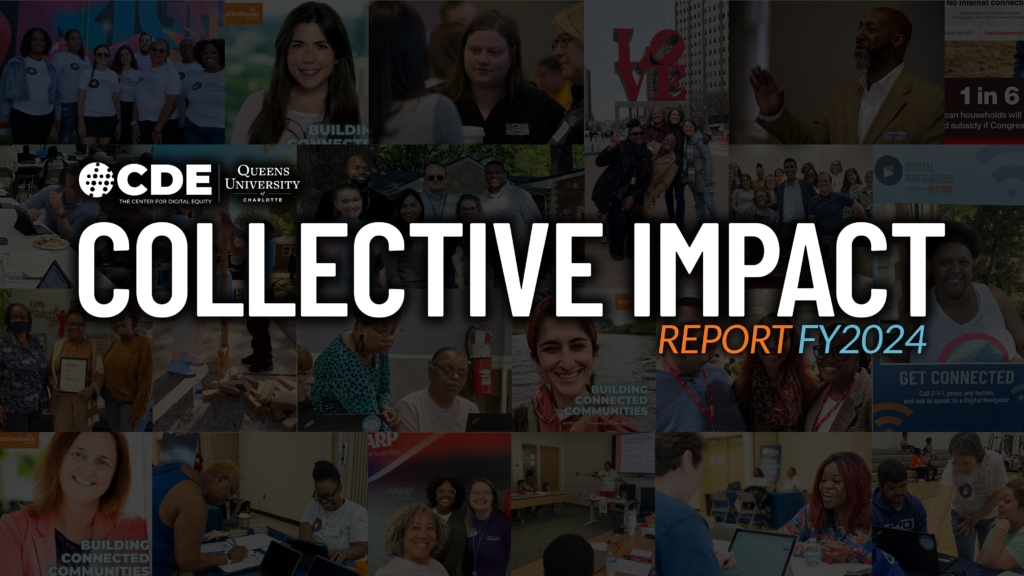
CHARLOTTE, NC – June 25, 2024 – The Center for Digital Equity (CDE) at Queens University of Charlotte proudly announces the publication of its second Annual Collective Impact Report. This report details the significant strides made in enhancing digital inclusion across Charlotte, emphasizing the crucial role of collective action in bridging connectivity and technology access gaps.
Through robust partnerships with public entities, private sector allies and community residents, a record number of underserved Charlotte households were provided with no-cost laptops, internet service and digital skills training.
FY2024 Achievements: A Year of Collective Action and Tangible Results
- Device Distribution and Connectivity: In partnership with Eliminate the Digital Divide (E2D) and other local organizations, CDE distributed more than 7,200 no-cost laptops, ensuring residents have the necessary tools to engage in today’s digital world. The City of Charlotte’s Access Charlotte program, supported by CDE, connected approximately 4,400 households to high-speed internet, significantly reducing the connectivity gap in underserved areas.
- Digital Literacy and Skilling Programs: Partners collectively facilitated more than 21,000 hours of digital literacy training, far surpassing the initial goal of 2,500 hours. Programs like Tech Titans 50+ with Charlotte Mecklenburg Library and AARP, and partnerships with Per Scholas and Goodwill, empowered vulnerable populations with essential digital skills. Additionally, a generative AI Journey Map tool was developed to speed the delivery of resources and provide a comprehensive guide to digital resources for community members.
- Policy, Advocacy, and Ecosystem Development: CDE hosted seven listening sessions with 80 participants from covered populations, shaping a policy agenda that reflects community needs. Collaborations with state and local agencies resulted in a comprehensive digital equity asset inventory, supporting a unified digital inclusion strategy across Mecklenburg County.
- Digital Navigation and Technical Support: CDE’s Digital Navigators handled 5,200 inquiries related to affordable home broadband, device purchasing, and digital skills learning, providing personalized support and facilitating access to essential digital resources.
- Organizational Growth: CDE strengthened its capacity by adding key positions, including a full-time Digital Navigator program director, and implementing a robust succession plan. A new funding strategy secured additional grants, expanding the resource base to ensure the sustainability and growth of CDE’s programs.
Looking Ahead
CDE remains committed to expanding our initiatives and deepening our impact. Plans include extending Digital Navigation and Skilling services to Gaston, Union, and Cabarrus counties, bringing equitable digital access to more communities. Our focus on innovative solutions, community engagement, and strategic partnerships will drive us toward a future where every resident can thrive in a connected and inclusive digital world.
“Our collective efforts have significantly advanced the mission to ensure equitable access to digital tools and skills – all essential for a thriving economy and democracy,” said Bruce Clark, executive director of the CDE. “We are grateful to our partners and community members for their unwavering commitment.”
“Digital inclusion is key to maintaining Charlotte’s edge in the global economy,” said Charlotte Mayor Vi Lyles. “The CDE annual report shows that by providing equitable access to digital resources, we are not only supporting our workforce development but also fostering a community where everyone can thrive. Ensuring that all residents can participate fully in our economy, from securing employment to accessing services, is fundamental to our city’s success and prosperity.”
The CDE’s ongoing partnership in the city’s Access Charlotte Project will give Digital Navigators the ability to provide 8,600 households with free internet access. Its partnership with the city’s Learn 2 Earn Pilot Program will continue improving digital and technical literacy and provide laptops in underserved communities.
“We appreciate the Center for Digital Equity for implementing digital inclusion efforts for the residents of Mecklenburg County and beyond,” said Annette Taylor, director of the N.C. Department of Information Technology’s Office of Digital Equity and Literacy. “This report demonstrates their partnership and the collective impact they have made for many North Carolinians.”
The full report is available at impact.thecenterfordigitalequity.org. For additional information about the Center for Digital Equity, visit thecenterfordigitalequity.org and follow the CDE on LinkedIn, X (formerly Twitter), and Instagram.
For media inquiries or interview requests:
Clare Vivas Lucas
Director, Marketing and Communications
Center for Digital Equity at Queens University of Charlotte
lucasc3@queens.edu | (704) 337-2338 Direct